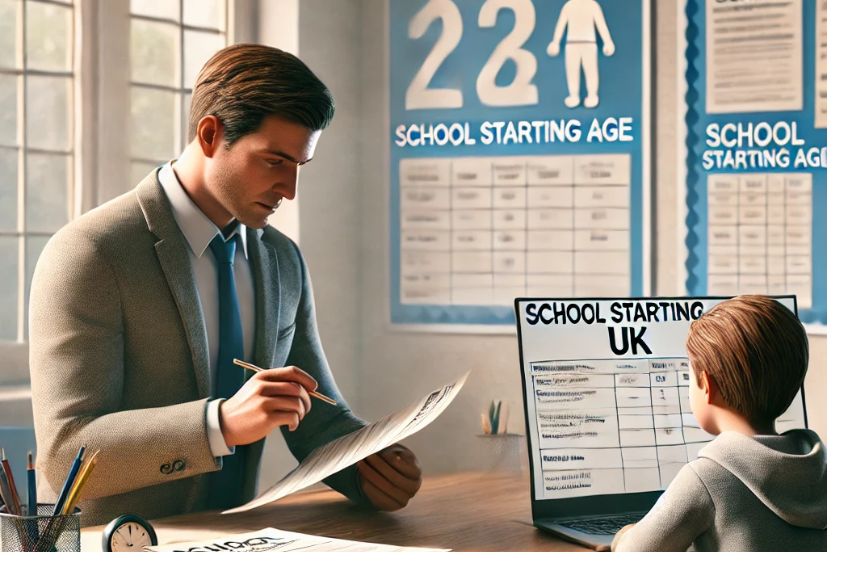In the United Kingdom, children typically begin their formal education in the academic year at the age of 4 or 5. Consequently, this pivotal age marks the start of a child’s educational journey, leading them through various stages of learning and development. Moreover, understanding the school starting age in the UK and the options available to parents is crucial, as it can significantly influence a child’s academic progress and social development. Therefore, parents must navigate multiple factors, including readiness, educational pathways, and local regulations, when deciding the right time for their child to begin school.
Ultimately, this guide aims to address key questions parents have about school starting age in the UK, highlighting system differences across the UK and providing practical recommendations to ensure a smooth transition into formal education.
Compulsory school age
The school starting age in the UK is generally straightforward but varies slightly depending on the child’s birthday and the regulations of each nation
- England: Children must start school by the age of four or five. They can begin in reception classes at four if their birthday falls before September 1st of that year.
- Scotland: Similarly, children must start school by age five, with most children entering in the August after their fourth birthday.
- Wales: In Wales, children can also start school at age four, but parents must enroll them by the time they turn five.
- Northern Ireland: Parents must ensure that their children start school by age four; similarly, children with birthdays falling in the latter part of the year may receive special considerations, just as they do in England.
Therefore your child must start full-time education once they reach compulsory school age. This occurs on 31 December, 31 March, or 31 August following their fifth birthday—whichever comes first. If your child’s fifth birthday falls on one of those dates, then they reach compulsory school age on that date. For instance, if your child reaches compulsory school age on 31 March, they must start full-time education at the beginning of the next term, which is the summer term of that year.
Moreover, the differences among these regions stem from historical educational philosophies and varying governmental approaches to childhood education. Consequently, these regional intricacies can make significant differences regarding the timing of a child’s entry into school and the support they receive.

The Role of School Readiness
School readiness encompasses a child’s social, emotional, and cognitive readiness to engage fully in the school environment. While age is a significant factor, parents should also assess other readiness indicators:
Social Skills: Is your child comfortable interacting with peers? Can they share, take turns, and express themselves in social situations?
Emotional Development: Can your child cope with separation from you? Are they able to manage minor frustrations?
Cognitive Skills: Does your child show curiosity about the things around them? Can they follow simple instructions, recognize some letters or numbers, and engage in basic problem-solving? When considering school starting age, it’s essential to assess these factors comprehensively, recognizing that each child is unique. Engaging in playful interactions and providing opportunities for socialization can enhance these skills before school starts.
Options for Starting School
Your child can start school later if you don’t think they’re ready for September. For instance, you may choose to postpone sending your child to school if they only turn four in August. However, by the time kids reach “compulsory school age,” they have to be enrolled full-time. When it comes to starting school, parents have a number of options:
Full-time vs. Part-time Options: Some schools offer flexibility, allowing children to start on a part-time basis, usually attending in the mornings only. This arrangement can help ease children into the school environment.
Deferral and Delayed Entry: If parents feel that their child is not ready for full-time school, they may apply for deferral. This allows children to spend an additional year in nursery or pre-school. Deferral can be particularly beneficial for younger children who may struggle with the transition.
Early Education Options: Nurseries and pre-schools provide valuable learning experiences for children aged 3-4. These settings focus on play-based learning and developing key social skills, preparing children well for the move into formal education.
Significance of Term Dates and the Child’s Birthday
Understanding term dates is critical since they significantly impact when children start school.
England and Wales: The school year typically begins in early September and runs until late July, divided into three terms: autumn, spring, and summer. Children born between September 1 and August 31 are allocated to the same year group.
Scotland: The school year starts in August and ends in June. Children starting primary school must have turned five on or before February 28 or 29 in the same year.
Northern Ireland: Similar to England, the school year begins in late August and runs through to July. This setup means that a child born just before the cut-off date may have quite different readiness than those born later in the academic year. For example, a child starting school at age four may not have had the same developmental experiences as a child who turns five just after the cut-off.

When does my child start school?
The specific date a child starts school often depends on their birthday. In many cases, children born between September 1 and the following August will start school in the same year. However, there may be variations depending on local policies.
| Date of Birth | When Does my Child start School? | When Do I Apply? |
| 1 Sept. 2020 to 31 August 2021 | September 2025 | 12 Sept. 2024 – 15 January 2025 |
| 1 Sept. 2021 to 31 August 2022 | September 2026 | 12 Sept. 2025 – 15 January 2026 |
| 1 Sept. 2022 to 31 August 2023 | September 2027 | 12 Sept. 2026 – 15 January 2027 |
| 1 Sept. 2023 to 31 August 2024 | September 2028 | 12 Sept. 2027 – 15 January 2028 |
School Year Allocation
Schools determine year group allocation based on a child’s age. Parents may have the option to request a different year group, but this is often subject to assessment and availability.
When it comes to schools determine which year group a child will be placed in based on their date of birth. The standard cut-off date in England, Wales, and Northern Ireland is usually September 1, which means that children born between September 1 and August 31 belong to the same academic year.
How Year Group Allocation Works
- England: Typically, children start in Reception if they turn four before September 1. Those born after this cut-off will start in the next academic year.
- Scotland: The school year begins in August. Children must turn five by February 28 (or 29 for leap years) to start in Primary 1.
- Northern Ireland: Similar to England, children who turn four before July 1 can start school; those turning four later will begin in the following year.
Exploring Educational Pathways Before School
Choosing the right educational pathway for your child before they start school is a significant decision that sets the tone for their future academic journey. With various options available, it’s essential to understand the choices that can provide the foundation for your child’s learning, social skills, and emotional development. In this blog, we will explore key pre-school educational pathways, including nursery options, home education, and Montessori approaches. Additionally, we’ll discuss school year allocation, how to apply for a school place, and available support for children with additional needs.
Pre-School Educational Pathways
Nursery Schools
Nursery schools provide structured educational settings for children aged 3 to 4 years old. There are public (government-funded) or private institutions:
- Play-Based Learning: Nurseries typically adopt a play-based approach, which allows children to explore, learn, and develop social skills through guided activities.
- Social Interaction: Nurseries provide opportunities for children to interact with peers, which helps with social skills such as sharing, cooperation, and communication.
- Transition to School: Many nursery schools focus on preparing children for the school environment through routines and structured activities.
Pre-Schools
Pre-schools (or playgroups) often cater to younger children and may operate on various schedules, including part-time attendance. They focus on play and nurturing environments that encourage exploration and creativity.
- Flexible Hours: Pre-schools may offer shorter or more flexible hours compared to full nursery settings, which can be ideal for parents looking for part-time care and education.
- Community-Based: Many pre-schools are community-based and provide a local focus, addressing community needs while fostering a sense of belonging.
Home Education
Home education allows parents to directly control and customize their child’s learning experience. Parents engage their children in various educational activities, from reading and arts and crafts to outdoor play and hands-on science experiments.
- Tailored Learning: Home education allows parents to tailor learning to their child’s interests, strengths, and developmental pace.
- Family Involvement: Parents can foster close family bonds and instill family values while ensuring their child receives personalized attention.
Montessori Schools
Montessori schools follow a child-centered educational approach developed by Dr. Maria Montessori. They typically cater to children from birth through elementary school, and some offer early pre-school programs.
- Child-Led Learning: In Montessori settings, children learn at their own pace using specially designed materials. This method encourages independence and self-directed learning.
- Mixed Ages: Montessori classrooms often include mixed-age groups, allowing younger children to learn from older peers while older children reinforce their knowledge by teaching others.
Additional Support
Parents of children with disabilities or those requiring additional learning support can access various provisions and resources.
- Special Educational Needs and Disabilities (SEND): If your child has special educational needs or disabilities, schools are legally required to provide appropriate support and make reasonable adjustments to accommodate them.
- Education, Health and Care Plans (EHCP): For children with significant needs, parents may request an Education, Health and Care Plan, which details the support required and is overseen by the local council.
- Government resources are available to assist parents in accessing early education and childcare support.

Options for Requesting a Different Year Group
If parents feel their child would benefit from being placed in a different year group—for example, if they believe their child is not ready for school—they can typically request a different allocation through their local council.
How to Request? – Parents should reach out to the school they wish their child to attend or contact the local council’s admissions office to discuss the process for requesting a different year group.
Information Needed: Documentation, such as evidence of the child’s readiness or developmental assessment, may be required to support the request.
How to Apply for a School Place
Applying for a school place for your child is an essential step in their educational journey. Parents typically apply for school places through their local council. There are specific deadlines for applications, and missing the deadline may limit options.
Here is a step-by-step guide to help you navigate the application process through local councils:
Step-by-Step Guide to Applying for a School Place:
- Research Schools: Start by researching local schools to determine which ones align with your child’s needs and your preferences. Consider factors such as academic performance, extracurricular activities, and the school’s ethos.
- Review School Admissions Criteria: Check the School admissions criteria for the schools on your shortlist. Each school may have specific requirements or policies regarding admissions, particularly if they are oversubscribed.
- Register with Your Local Council: To apply for a school place, you must register with your local council. This registration process typically allows you to receive information regarding school applications.
- Complete the Application Form: Fill out the school application form as instructed. This form may be completed online or on paper, depending on your local council’s process. Ensure you provide all required information, including your child’s details and your preferred schools.
- Submit Your Application: Submit your application by the designated deadline. Ensure it is completed accurately and includes any necessary supporting documents.
- Await the Admission Decision: After applications are submitted, councils will review them and allocate school places based on the school admissions criteria. You will receive an admission decision usually in April for primary schools.
- Accept Your Place: If your child is offered a place at a school, you will need to formally accept it. This is usually done through written communication with the school or council.
Key Dates for Applications:
- September to January: The application window typically opens in September for children starting school in the following academic year and closes around mid-January.
- February to March: Schools process applications and finalize allocations during this period.
- April: Decision letters are usually sent out, informing parents of their child’s school placement.
- May to September: Parents must confirm acceptance of places and prepare for the transition to school.
What Happens If You Miss the Application Deadline?
If you miss the application deadline:
- Your application may be considered late, which could reduce the chances of securing a place in your preferred school.
- Late applications are usually placed at the end of the queue, meaning you might receive a place only after all on-time applications have been processed.
- Some councils may allow you to reapply or submit an appeals process if your application is not successful.
Conclusion
In conclusion, ensuring a smooth transition into school is a fundamental part of a child’s educational experience. By taking a proactive approach to researching schools, understanding application processes, and leveraging available support resources, you can help facilitate a positive start for your child.
Additionally, consider seeking the help of the best online tutors in the UK, who can provide personalized guidance and support to address any academic gaps after the school starts. Don’t hesitate to contact local councils or schools directly for personalized advice and assistance tailored to your specific situation.
Parents should consider their child’s individual needs, explore the available options, and communicate with the school to ensure a positive experience. Every child’s educational journey is unique, and with the right support and planning, you can ensure a bright and successful start for your little one at school.








